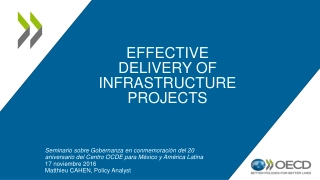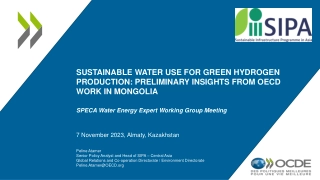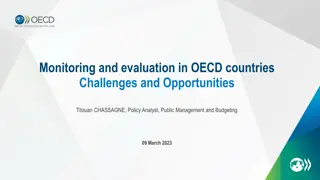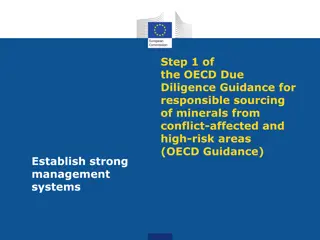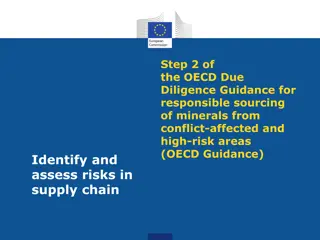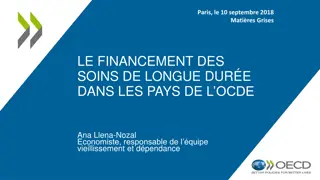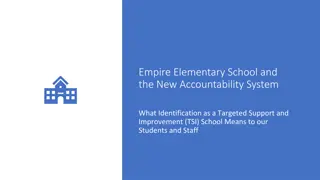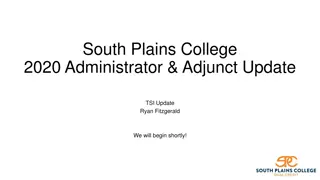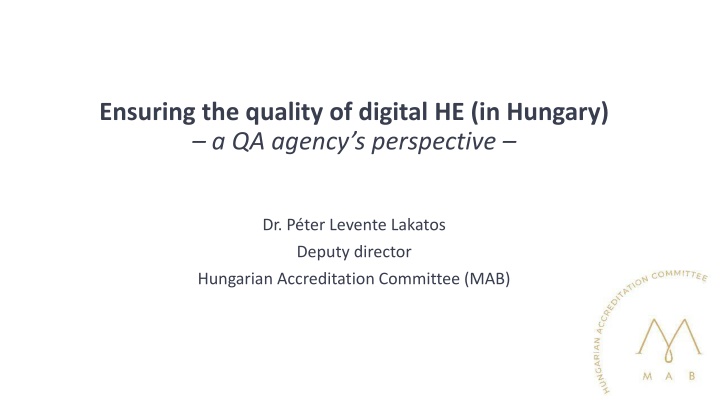
Quality Assurance in Digital Higher Education in Hungary: Insights from MAB Deputy Director Dr. Péter Levente Lakatos
Gain valuable insights into ensuring the quality of digital higher education in Hungary from Dr. Péter Levente Lakatos, Deputy Director of the Hungarian Accreditation Committee (MAB). Explore the significance of quality assurance in responding to changes in higher education, with a focus on ESG guidelines and the role of students in the learning process.
Download Presentation

Please find below an Image/Link to download the presentation.
The content on the website is provided AS IS for your information and personal use only. It may not be sold, licensed, or shared on other websites without obtaining consent from the author. If you encounter any issues during the download, it is possible that the publisher has removed the file from their server.
You are allowed to download the files provided on this website for personal or commercial use, subject to the condition that they are used lawfully. All files are the property of their respective owners.
The content on the website is provided AS IS for your information and personal use only. It may not be sold, licensed, or shared on other websites without obtaining consent from the author.
E N D
Presentation Transcript
Ensuring the quality of digital HE (in Hungary) a QA agency s perspective Dr. P ter Levente Lakatos Deputy director Hungarian Accreditation Committee (MAB)
including growth of internationalisation, digital learning and new forms of delivery. The role of quality crucial in supporting higher education systems and institutions in responding to these changes assurance is The ESG ( ) provide guidance, covering the areas which are vital for successful quality provision and learning environments in higher education.
ESG 1.1: HEIs should have a policy for QA that is made public and forms part of their strategic management. Internal stakeholders should develop and implement this policy ( ), while involving external stakeholders. - E-learning is part of the overall strategy (as well as QA policy) - HEI uses policy framework and governance structure when adopting new technologies to ensure the expected quality of e-learning provision ESG encourages students to take an active role in creating the learning process, and that the assessment of students reflects this approach. 1.3: HEIs should ensure that the programmes are delivered in a way that - Technical infrastructure is aligned with the teaching methodology - Staff needs to be trained to be able to provide contents, assignments etc. - Appropriate assessment methods ESG 1.6: HEIs should have ( ) adequate and readily accessible learning resources and student support are provided. - HEIs should analyze the learner profile of e-learning students - Access to library resources and labs (included in MAB Standards, see at IA Guide, II.6. question 13.)
Documents, projects for reference ENQA - Considerations for QA of E-learning Provision https://www.enqa.eu/publications/considerations-for-qa-of-e-learning-provision/ Tesla Project (Enhancing Trust in E-Assessment) https://tesla-project-eu.azurewebsites.net/work-package/wp4/ EUA - DIGI-HE Survey report https://eua.eu/downloads/publications/digihe%20new%20version.pdf
MABs role: Dissemination Workshop Publishing studies in HAR Working Groups on: QF & ECTS Recognition QA Review of procedures Institutional accreditation Ex post evaluation OECD (2021) "Quality and value of micro-credentials education: Preparing future", OECD Education Policy Perspectives https://doi.org/10.1787/9c4ad26d- en in higher for the
Importance: 50 % - of adult learning happens through non- formal education 9 % - of 25 64 year olds participate in some form of (mostly tertiary) formal education (Eurostat, 2020) The future of HE will be (mostly) digital or not at all

